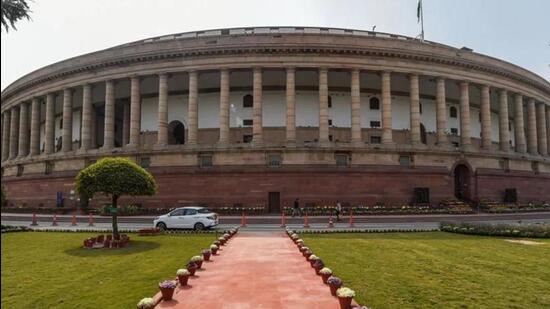Parliamentary panel submits report on Mediation Bill, 2021
The objective of the bill is to settle any civil or commercial disputes through mediation before seeking court or tribunal’s intervention
The Parliamentary standing committee on personnel, public grievances, law and justice on Wednesday submitted its report on Mediation Bill, 2021 to the Lok Sabha Speaker Om Birla and Rajya Sabha Chairman M Venkaiah Naidu. The committee, headed by BJP MP Sushil Modi, made several observations and provided recommendations after holding extensive deliberation on the bill.

“The Committee was made to understand that authorities under LSA (Legal Services Authority Act) have been chosen as mediation service providers owing to their pan-Indian presence. The Committee, therefore, recommends that apart from the authority constituted under Legal Services Authority Act, the Government may explore the feasibility of designating other bodies like State Mediation Council to act as mediation service providers,” said the report.
Also Read: Lok Sabha lists private members’ bills ahead of Parliament’s monsoon session
The bill was introduced in Rajya Sabha on December 20, 2021, with an aim to reduce the pendency of cases in courts. The objective of the bill is to settle any civil or commercial disputes through mediation before seeking court or tribunal’s intervention. The Rajya Sabha Chairman referred the Mediation bill for examination and report on December 21, 2021. Naidu further granted an extension of one month from June 22, 2022.
Parties can appoint any person as mediator upon agreement. The results of mediation will be treated in line with court judgments.
The committee held 10 rounds of meetings with the Secretary, department of legal affairs and senior officials of the Union ministry of law and justice. It also sought the views of citizens, lawyers, mediation experts and institutions, the Supreme Court, high courts, bar councils, judges, academicians and representatives from the Indian industries and commerce.
The report noted that clause 2 (2) of the bill has provisions to exclude the Central and state governments from non-commercial disputes with the government as one of the parties. The committee further recommended not excluding government-related disputes from the bill’s ambit.
The committee further observed that the definition of ‘international mediation’ in the bill and the provisions of the Singaporean Convention are incorporated into the bill. “The Committee observes that the purpose of the Singapore Convention is to facilitate international trade and commerce by enabling disputing parties to easily enforce and invoke settlement agreements across borders. The Committee was informed by the Ministry that India has not ratified UNISA (United Nations Convention on International Settlement Agreement) yet,” the report said.
Clauses 6, 7, 8, 9 and schedule 1 of the bill are interconnected and contradictory at the same time, the report noted. Clause 6 mentions that pre-litigation mediation will also be implemented in matters pending before the tribunals. “The Committee fails to understand as to how the matter pending before a tribunal will be treated as pre-litigation mediation,” said the report. It further recommended clauses 6, 7, 8 and 9 to rearrange for better clarity.
“Making pre-litigation mediation mandatory may actually result in delaying of cases and may prove to be an additional tool in hands of litigants to delay the disposal of cases,” the committee said. It suggested reconsidering the compulsory provisions of pre-litigation mediation.
The report further observed that the time limit of 180 days to complete the mediation process is too long and it recommended reducing the time limit to 90 days and further an extension period of 60 days instead of 180 days.
“The Committee appreciates the Ministry for instituting a framework for resolution of disputes that are likely to affect the peace, harmony and tranquility in society,” the report said.
The government will set a Mediation Council of India to register mediators and recognise mediation institutions and mediation service providers.





